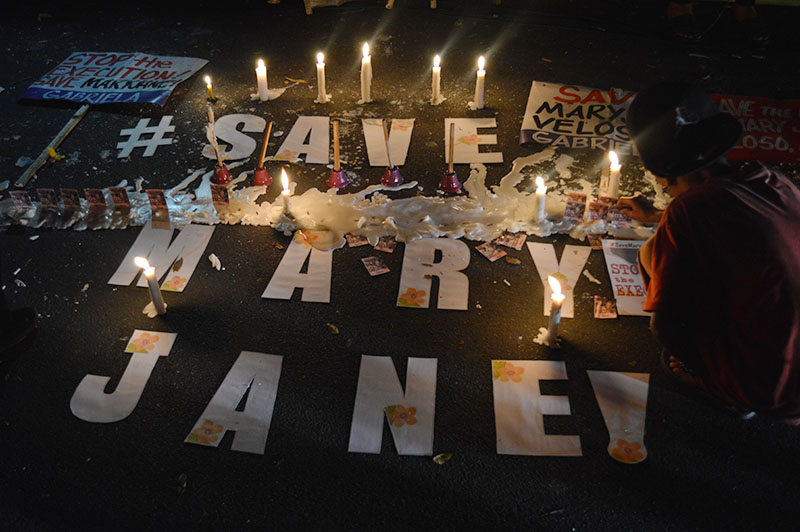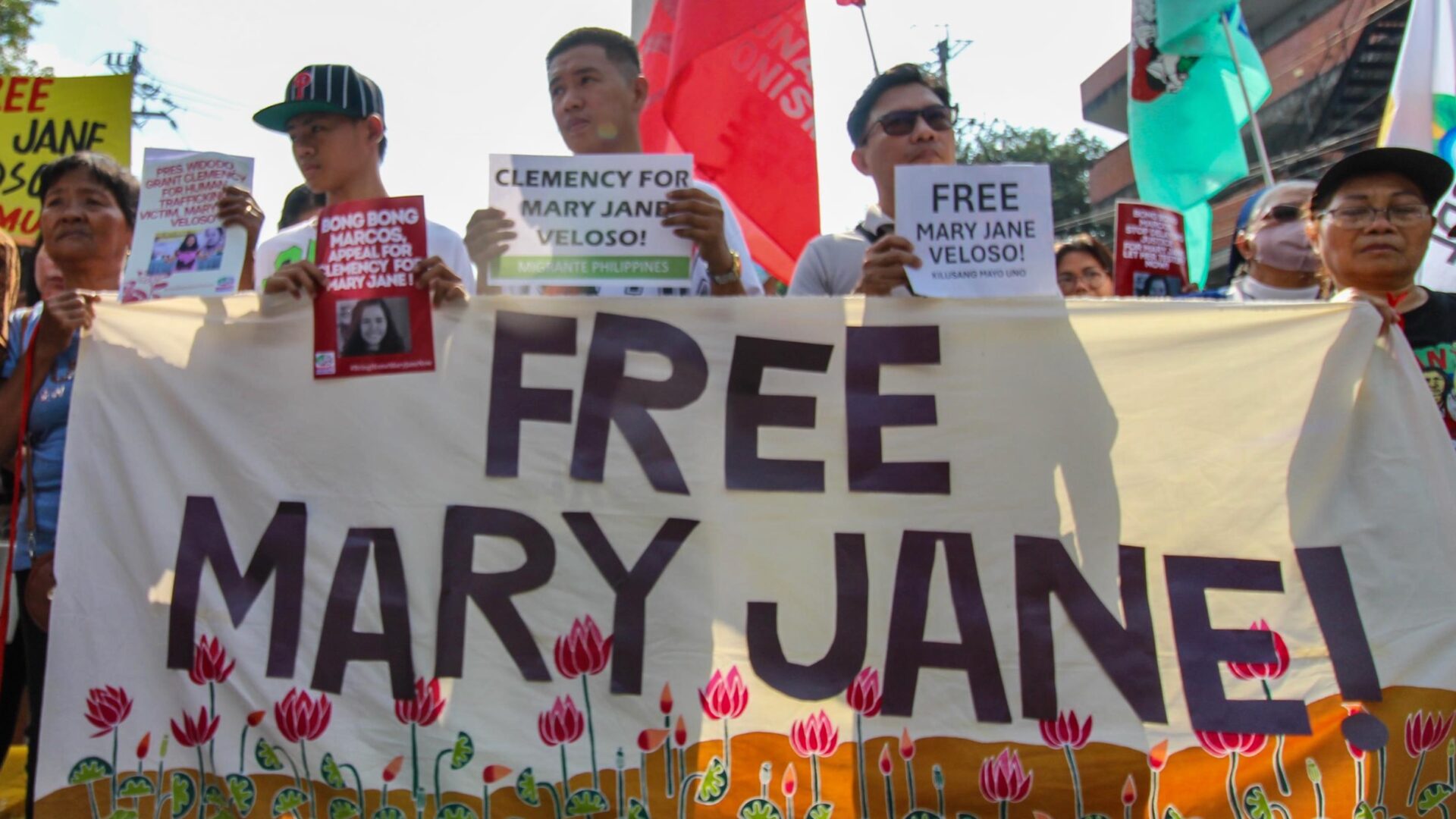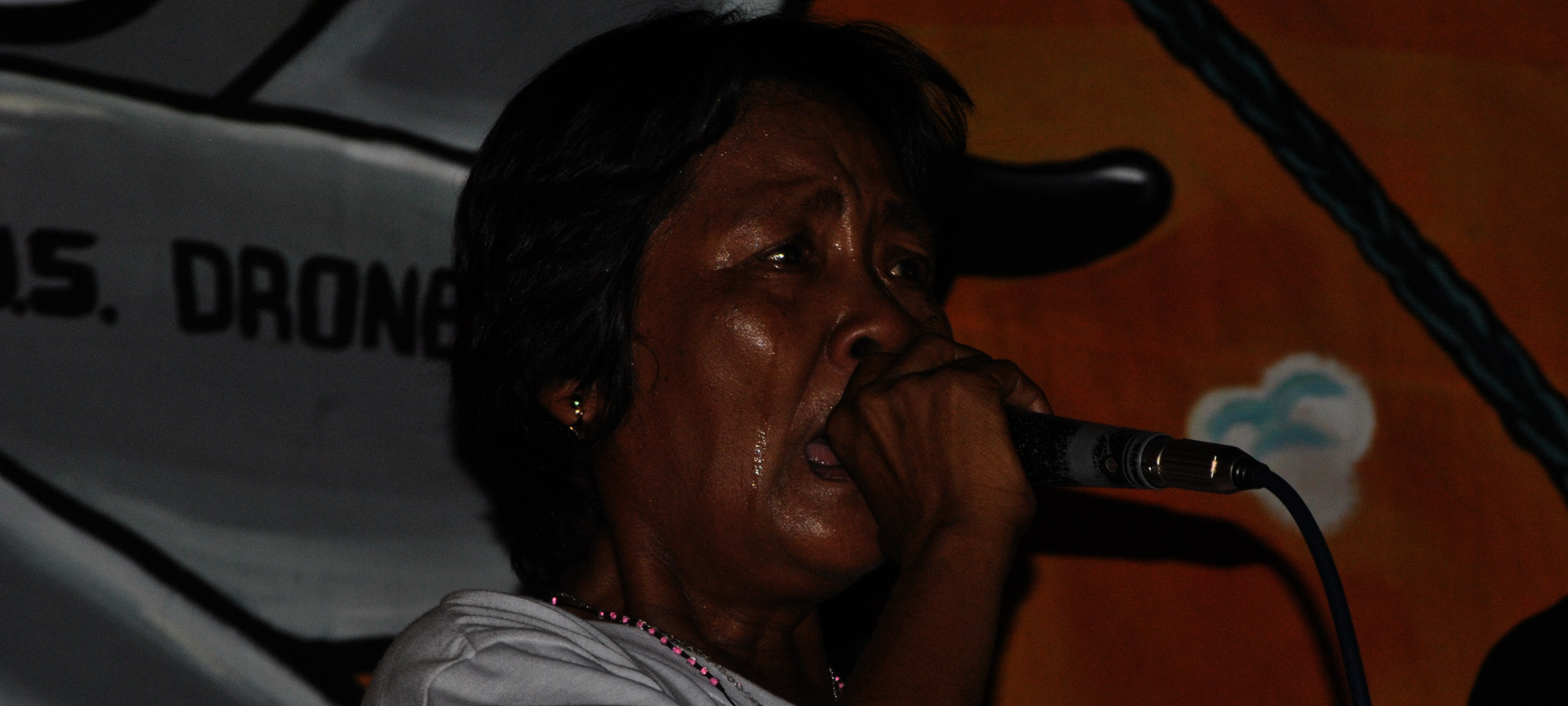Did Noynoy do enough to #SaveMaryJaneVeloso? Here are five points that prove he didn’t.
During the past few days and hours, President Aquino, according to his spokespersons, has been busy trying to convince Indonesian President Joko Widodo to save overseas Filipino worker Mary Jane Veloso from the firing squad. He did the five-minute walk with Jokowi and asked him to consider Mary Jane as a witness against drug cartels […]


During the past few days and hours, President Aquino, according to his spokespersons, has been busy trying to convince Indonesian President Joko Widodo to save overseas Filipino worker Mary Jane Veloso from the firing squad. He did the five-minute walk with Jokowi and asked him to consider Mary Jane as a witness against drug cartels in Indonesia. The Indonesian president apparently remains unmoved.
At the same time, a foreign affairs spokesperson said that Mary Jane was given due process by the Indonesian government to prove her innocence. He likewise — and predictably so — defended the Aquino government, saying that they did all they could possibly do to save Mary Jane. We remain unconvinced.
Here are five reasons why.
1. The Aquino government failed to provide legal support for Mary Jane in 2010.
Mary Jane herself confirmed this: the Philippine embassy officials failed to give her legal support. It was the Indonesian police that stepped in to provide her with legal representation as her case was being investigated and tried. The Indonesian court, for its part, also failed to give her a competent and professional translator so that she may understand the proceedings and defend herself in court.
In an interview with Pinoy Weekly, Garry Martinez of Migrante International said this has been the case with an overwhelming number of Filipinos in legal trouble abroad. “Many embassy and consulate officials, it seems, are often ‘afraid’ to cross hairs with their host governments that they often fail to adequately give support or assistance to distressed Filipino abroad,” said Martinez. There are at least 124 other Filipinos currently on death row in different countries, while 7,000 are in jail in foreign lands for various offenses.
Progressive lawmakers, meanwhile, pointed out that the Aquino government had more than enough funds to hire competent lawyers for beleaguered Filipinos abroad. “The Department of Foreign Affairs has by law, an annual budget of P100-Million for Assistance to Nationals (Filipinos abroad in distress). Only P4-M was utilized last year. Why was it not be used to hire lawyers and interpreters to assist OFWs in crisis situations, like Mary Jane Veloso?” Gabriela Rep. Luzviminda Ilagan asked.
Meanwhile, this happens. A lot.
2. The Aquino administration (and earlier administrations, for that matter) has refrained from publicizing actual cases of Filipinos on death row — even Mary Jane’s — until it is all but too late.
If not for Migrante International’s campaign to save Mary Jane (which is part of their long-standing, global campaign to publicize and gather support for overseas Filipino workers on death row) this first quarter of 2015, the public would not have known of Mary Jane’s case and the circumstances of her arrest and detention.
A public information campaign to help Filipinos in death row abroad — and distressed OFWs in general — would greatly help in gathering support for these Filipinos, who are often persecuted under repressive regimes and conservative laws like that of Saudi Arabia. Filipino migrant workers often work in the most stressful and risky situations. Migrant women are especially vulnerable to sexual abuse. Confronted with the threat of abuse, many of them are forced to defend themselves. And in repressive countries like Saudi Arabia, defending oneself (i.e. inflicting harm or even killing an attacker, even in self-defense) is often considered criminal, especially if one is a migrant.
As we have seen with the case of Mary Jane, a public information campaign can solicit support for broad sections of the public. If this was done earlier (say, at least a year ago), it is highly probable that it would have made more impact on the Indonesian courts trying her case, as well as on Indon politicians to act in favor of Mary Jane. After all, pressure politics and diplomacy often play a major role in death penalty cases involving foreigners.
3. President Aquino had much political leverage in negotiating for Mary Jane’s clemency since 2010. It appears he utilized little of that in negotiating with Widodo.
If Aquino only took half the time he spent helping out the United States in its pivot to Asia, he would have gained much in terms of securing clemency for Filipinos on death row. In Mary Jane’s case, the Aquino administration could have invoked the long-standing close relations between the Philippines and Indonesia. Indonesia is the Philippines’ 11th biggest trading partner, with US$3.6-Billion in trade in 2013. Both countries have been allies for ages, and were co-founding members of the Association of Southeast Asian Nations (Asean) and the Non-Aligned Movement. The Philippines and Indonesia are first and second, respectively, in exporting labor to other countries in the world.
Last year, both countries concluded the negotiations to end a long-standing border dispute in the overlapping exclusive economic zones in Mindanao and Celebes Seas. Just this February, newly-elected Indon President Joko Widodo undertook a state visit to the Philippines. It was a perfect opportunity to attempt to leverage the close diplomatic and trade relations between the two to secure clemency for Mary Jane, who was by then already sentenced to die by firing squad.
Aquino could have even invoked his administration’s efforts to put to justice “terrrorists” like Marwan, who it claimed was one of the bombmakers responsible for the bombing in Bali, Indonesia in 2002.
4. President Aquino did not use pressure politics to force Widodo to at least stay the execution and allow the Indonesian court to hear the second judicial review on Mary Jane’s case.
While the Australian government has been at Widodo’s cross hairs for a while now over the death sentence of two of its citizens, the Aquino administration has refrained from ruffling feathers over Mary Jane’s case.
This is an especially important point, because Widodo came to power in Jakarta on the strength of his reputation as a “reformer” and anti-illegal drugs crusader. The Hollande government of France has, at least, employed enough pressure on Widodo (even invoking the European Union’s relations with Indonesia) to force the latter to at least stay the execution of a Frenchman on death row. Meanwhile, the Brazilian and Dutch governments went ahead with their threats to recall their ambassadors after their citizens were executed by the Widodo government despite their pleas. With the looming Asean integration, Aquino could have actively used the Asean platform to pressure Widodo.
If you think these actions are “too extreme” to save “just one” Filipino citizen, take note that the Australian, French, Brazilian and Dutch governments did these “extreme” actions because they apparently thought that they owed it to their constituents to do everything in their power to save their one citizen on death row in Indonesia. Meanwhile, Department of Foreign Affairs officials assured that Mary Jane’s case would not affect diplomatic relations between Indonesia and the Philippines.
5. Aquino’s foreign affairs official has been quoted as defending Indonesia’s actions
As if the government’s inaction was not damaging enough to Mary Jane’s chances of securing clemency, DFA spokesperson Charles Jose yesterday basically said that the Indonesian government was fair in its handling of Mary Jane’s cases — despite revelations by Mary Jane herself, as well has her Indonesian and Filipino lawyers, that she was not given a fair trial (for lack of a competent translator, among others). ““We know she was given due process and her rights were upheld throughout this legal process,” Jose said. The DFA spokesperson has basically absolved the Indonesian government of any possibility of wrongdoing or weakness in its handling of Mary Jane’s case.
Again, it’s as if the Aquino administration was afraid of offending or even inconveniencing the Indonesian government to save the life of Mary Jane Veloso.



